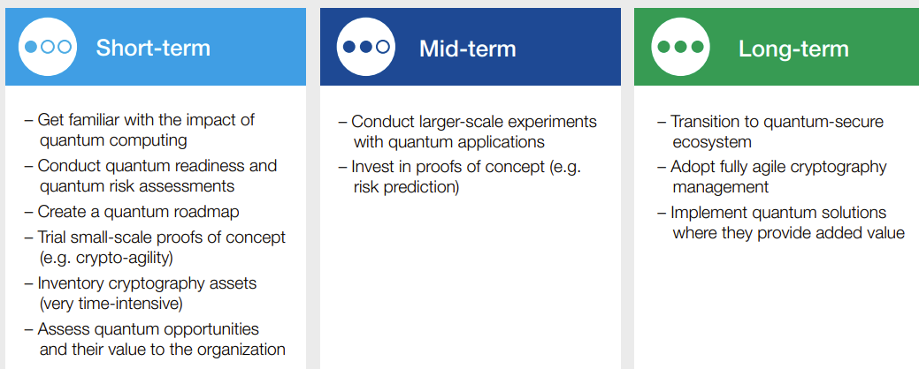
Technology revolutions can arrive unanticipated, their risks mitigated reactively at best. Think about the internet, whose security vulnerabilities were exposed with mass adoption, and which continues to pose Whac-a-Mole-like challenges to the present day.
Quantum computing may seem sci-fi-like. Based on subatomic properties, it promises gains in processing power far beyond those associated with progressive generations of semiconductors.
Although years if not decades until full fruition, the quantum leaps are calculable, at least in theory. They are beginning to be borne out in the marketplace, pointing toward opportunities to apply exponentially accelerated performance in such scientific and business applications as complex modeling, simulations and optimizations.
On the flip side is the risk of the technology falling into the wrong hands. It could render obsolete the encryption-security codes on which global finance and commerce have come to depend.
IBM’s Heron project indicates the progress, not necessarily linear, toward a quantum future. Measured in quantum bits, or qubits, the Heron processor was to debut this year at 133. That’s well below the previously set 1,127-qubit goal for the Condor processor. Yet Heron is being touted as a major step toward modular quantum computing.
“The chips will be connected with conventional electronics, so they will not be able to maintain the ‘quantumness’ of the information as it passes from one processor to another,” according to Quantum Computing Lab. “But the hope is that these chips, interconnected with fiber-optic or microwave connections, will pave the way for large-scale distributed quantum computers with a million interconnected qubits, orders of magnitude necessary to execute useful algorithms in practice and free of errors.
“This shift in the field, together with recent discoveries and high levels of investment, suggests that general-purpose quantum computers may be closer than previously thought.”
A Narrow Runway – for Now
Quantum computing is still at the stage of “being viewed as bigger and better calculators,” says Bill Klein, a quantum computing and artificial intelligence consultant and former R&D imagineer, principal, at Walt Disney Imagineering. “There is an amazing amount of great work being done to understand the physics, create algorithms and develop tools to use quantum computers today. However, I believe we have not yet discovered the new and unique paradigm shift that will truly unlock the power of quantum computing.”
Robert Sorensen of Hyperion Research
Currently expected performance gains are largely for a narrow set of problems that may be out of the reach of classical computers to effectively solve, according to Robert Sorensen, senior vice president and chief analyst for quantum computing at Hyperion Research. “The quantum computing sector has not yet reached the stage where there is a clear-cut performance advantage to classical counterparts,” but there is real promise for “the next few years and beyond,” Sorensen says.
In an IBM Quantum study with University of California collaborators, reported in the journal Nature and SciTechDaily, a 127-qubit computer outperformed a classical supercomputer on a specific type of calculation – another indication that the quantum timeline may be shorter than scientists had been assuming.
According to Sorensen, “The issue today is that end users looking for the next level of computational performance gains need to begin exploring the algorithms, applications and use cases that quantum computing can bring to their most important current and planned computational problems. That will let them be ready when true production-capable quantum computing systems become available.”
“Most of the conversation related to quantum computing and risk revolves around the risks of not getting familiar with quantum computing,” Klein says. “This is especially true in the area of cybersecurity and encryption.”

Goals for managing quantum risk, from World Economic Forum, Transitioning to a Quantum-Secure Economy.
Shoring Up Cryptography
A looming, tangible issue for risk managers, particularly regarding information security, is the near- to medium-term likelihood for a changeover to so-called post-quantum cryptography (PQC). It would protect against compromises of encryption algorithms by quantum-scale computation.
“Given the current pace of quantum computing research, a quantum computer capable of breaking modern cryptography is estimated to arrive within the next two decades,” states a recent IEEE Spectrum article citing a European Policy Center report. “That’s barely enough time for policymakers to plan and implement the technical and logistical actions necessary to be ready for a world with quantum computers, says report author Andrea G. Rodríguez.”
The U.S. Department of Commerce’s National Institute of Standards and Technology (NIST) is undertaking a PQC project that is expected to publish standards in 2024. (Initial drafts of three quantum-resistant Federal Information Processing Standards are open for public comment until November 22.)
NIST, the National Security Agency (NSA) and the Cybersecurity and Infrastructure Security Agency (CISA) have issued a joint “Cybersecurity Information Sheet” stressing the need to “proactively protect the confidentiality, integrity and authenticity of sensitive information” and prepare for implementation of the PQC standards.
Raphael Auer of the BIS Innovation Hub Eurosystem Center
The Eurosystem Center of the Bank for International Settlements’ Innovation Hub – with the central banks of France and Germany participating in “Project Leap” – said in June that it had addressed “the threat that future quantum computers represent to today’s cryptographic algorithms” by successfully establishing a quantum-safe communications channel.
“Project Leap makes an important contribution to mitigating the threat posed by quantum computers to the confidentiality of financial data and the stability and integrity of the global financial system,” Eurosystem Center head Raphael Auer said in a statement. “While we do not know exactly when quantum computers will be strong enough to crack today’s encryption, central banks need to prepare themselves. Project Leap is a blueprint for how they can do so.”
Hierarchy of Targets
For the average user with a bank account, “logging in is protected by cryptography,” Dustin Moody, who leads NIST’s PQC effort, told IEEE Spectrum. That won’t be a likely hacking target “until quantum computers are really cheap and inexpensive to operate. And we’re nowhere near that point.”
In other words, the article went on, “no one should expect a CRQC [cryptographically-relevant quantum computer] to be emptying out bank accounts when they first arrive – not because they can’t, but because a bank account isn’t a worthwhile target. Quantum computers will be expensive to operate, and as a result, attacks by quantum computers will likely be directed at high-value targets like countries or important industries. In those domains, targets may already be susceptible to ‘harvest now, decrypt later’ attacks that collect encrypted information now for future decryption using quantum computers.”
Paul Mee of Oliver Wyman
“Risk managers need to stay well informed of progress in PQC development and deployment to be best positioned to install such schemes quickly and effectively as they become available,” Hyperion’s Sorensen says.
The Arms Race
Meanwhile, on the geopolitical and global competitiveness front, China is spending some $15 billion a year on quantum research in an attempt to seize world leadership, says Paul Mee, Oliver Wyman partner and Cyber Platform Lead, Americas. Quantum computing is one of the strategic technologies mentioned in President Joe Biden’s August executive order seeking to curb investments in “countries of concern.”
“We are seeing massive advances in investment across the planet,” Mee observes. “But the arms race, so to speak, really needs to be won by the United States. We don’t want other countries to take the lead in quantum computing and be able to turn it against us in ways that we don’t want to have done.”
Artificial intelligence software company Beyond Limits in June signed a memorandum of understanding with European quantum leader IQM “to drive AI quantum computing advances” in the Asia-Pacific region. And in what is termed a step to democratize access to on-premises hardware, “IQM Spark” offers a 5-qubit processing unit and related support to universities and research labs to “kick-start their quantum programs.”
Quantinuum, said to be the biggest quantum computing vendor, announced with HSBC plans for exploratory projects for the banking sector in cybersecurity, fraud detection and natural language processing. The collaboration “brings together a deep expertise in the application of quantum computing across a set of areas that are critical in global finance, such as protecting vital data and assets, managing risk and creating first-of-its-kind customer service approaches,” said Quantinuum chief product officer Ilyas Khan.
Ilyas Khan of Quantinuum
QC Ware and JPMorgan Chase & Co. in March said they completed a quantum deep hedging study “paving the way for future increased risk mitigation capabilities in financial services.”
The World Economic Forum and Deloitte collaborated on the Quantum Readiness Toolkit, described as “actionable guidance to help protect organizations during the rapid development of quantum computing technology.”
The toolkit is a follow-on to 2022’s Transitioning to a Quantum-Secure Economy, which stressed the need for organizations “to act now on the quantum threat.” The report said quantum technologies “represent a significant and tangible risk to digital economies, with potential global impact. If this risk materializes, it could overshadow the great benefits that quantum technologies could offer mankind.”
“The transition to a secured quantum computing era is a long-term intensive community effort that will require extensive collaboration between government and industry,” Rob Joyce, the NSA’s cybersecurity director, said in August. “The key is to be on this journey today and not wait until the last minute.”
How High the Stakes?
At the geopolitical level, says Thomas P. Vartanian, executive director of the Financial Technology & Cybersecurity Center and author of The Unhackable Internet, “You can see the enormous implications for security, the functioning of economies, and the combination of those two. In my mind, it equates to the continuation of democracy and freedom.”
There are reports that China, pursuing quantum superiority, is engaged in “harvest now, decrypt later,” that is, when quantum computing is fully developed. To Vartanian, that means government officials must worry about geopolitical stability and democracy as quantum technology advances.
“Democratic countries like the United States need to be the first quantum computer leaders,” Vartanian insists. They could then “come up with quantum cryptography that will protect all that data” from more authoritarian threats.
While the U.S. has a “get there first” imperative, Vartanian contends, “The problem is that China is outspending us . . . No amount of executive orders is going to make up for the spending differential.”
“That’s the fear: Who’s going to get the technology to decrypt it first,” Martin Schmidt, president of Rensselaer Polytechnic Institute, said in an Albany Times Union report about plans for quantum computing and related research at the Troy, New York, school. Schmidt compared the moment to the artificial intelligence/machine learning takeoff around 2015, which caught Massachusetts Institute of Technology, where he was then provost, more by surprise.
Topics: Innovation